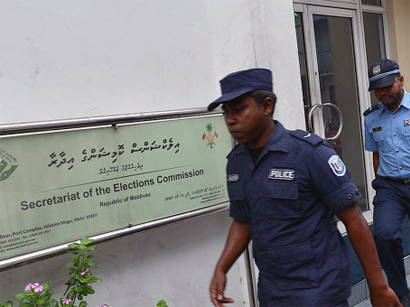The first democratically elected president of the Maldives and the brother of the country's former autocratic ruler have qualified for a runoff according to results in the island nation's presidential election, the Associated Press reported. But the Supreme Court has postponed Sunday's runoff by six days, setting the stage for a constitutional crisis in this tourist paradise nation that has been buffeted by political turmoil for the past five years.
Mohamed Nasheed, who resigned as president of the Indian Ocean archipelago last year, won nearly 47 percent of the popular vote in Saturday's election, while Yaamin Abdul Gayoom, the brother of 30-year autocratic ruler Maumoon Abdul Gayoom, trailed with 30 percent. A third candidate businessman Qasim Ibrahim had 23 percent.
A runoff between the top two candidates was required as neither received at least 50 percent of the vote.
It was supposed to be held Sunday, but hours earlier the Supreme Court ruled in favor of a petition filed by a member of Ibrahim's Jumhoory Party who asked for a postponement arguing there was little time to campaign or forge alliances. The court set the runoff election for Nov. 16 as it was originally scheduled before it was moved up on President Mohamed Waheed Hassan's behest to avoid a constitutional crisis.
Hassan's term ends Nov. 11 and the constitution requires an elected president be in office by that date. The Supreme Court on Saturday reiterated its previous ruling that Hassan will stay in office until a runoff election is held if no clear winner emerged from the first round, ignoring the possibility of a political logjam.
The Maldives, which is known for its luxurious resorts, has faced much upheaval in the five years it has been a multiparty democracy. Society and even families have been divided along party lines, and institutions like the judiciary, public service, armed forces and police have worked in different directions and been accused of political bias. There is fear that continued political turmoil could harm Maldives' reputation for stability and economy. The country is heavily reliant on tourism, which contributed 27 percent to the gross domestic product in 2012.
The next president faces huge challenges in building public confidence in government institutions and dealing with pressing issues including high unemployment, increasing drug addiction among young people and improving transportation among the far-off islands.
Gayoom also told reporters late Saturday that he wants a postponement of the runoff to sort out alleged discrepancies in the voters' list. Nasheed had said the elections were fair.
There is deep mistrust between Nasheed, Hassan and the Supreme Court because the former president believes the other two are under the influence of Maumoon Abdul Gayoom himself.
The integrity of the Supreme Court itself has been called into question with the United Nations human rights chief Navi Pillay last week accusing it of interfering with the presidential election and subverting the democratic process.
Nasheed's Maldivian Democratic Party had insisted that the runoff be held as planned accusing his opponent of "once again, trying to subvert democracy by refusing to sign the voter lists."
It called on the international community to do everything possible to ensure that a president is elected by a constitutional deadline that falls on Monday, Nov. 11.
"The international community must apply pressure, including targeted, punitive sanctions, on those individuals who seek to undermine Maldivian democracy," the party said.
The United States asked authorities to hold the runoff immediately, saying a delay beyond Nov.11 could result in uncertainties that could destabilize the country.
Voters deserve a greater degree of predictability over something as serious as a presidential election," State Department spokeswoman Jen Psaki said in a statement.
Saturday's elections were the third attempt to elect a president this year. Two previous attempts since September failed with questions over the accuracy of the voters' list prepared by the Elections Commission. The chaos left voters isolated and divided, and their country's new democracy under threat.
Observers had regarded the September election as largely free and fair, but the Supreme Court said it found the voters' register included fake names and those of dead people. Police stopped a second attempt to hold the election last month, claiming all the candidates had not endorsed the voters' list as mandated by the Supreme Court.
Some 240,000 people were eligible to vote in the predominantly Muslim nation and despite a slow start the turnout was about 86 percent by the time polls closed.
Nasheed defeated Maumoon Abdul Gayoom in the country's first multiparty election in 2008, ending his 30-year autocratic rule. But Nasheed resigned last year after weeks of public protests and signs of declining support from the military and police after he ordered the arrest of a senior judge he perceived to be biased. His opponents also accused him of undermining Islam because of his friendly relations with Israel and Western nations.
Nasheed claimed that he was ousted in a coup and accused his then-deputy Hassan of backing it. An inquiry commission set aside his claim of a coup but the country has since been in political turmoil.






